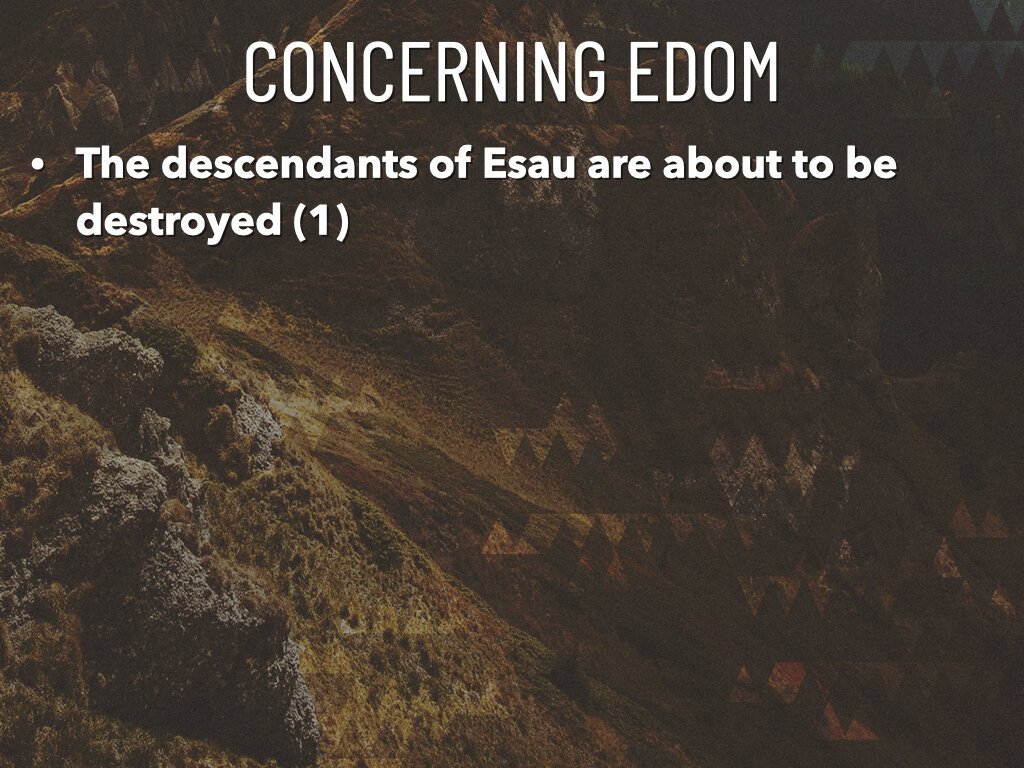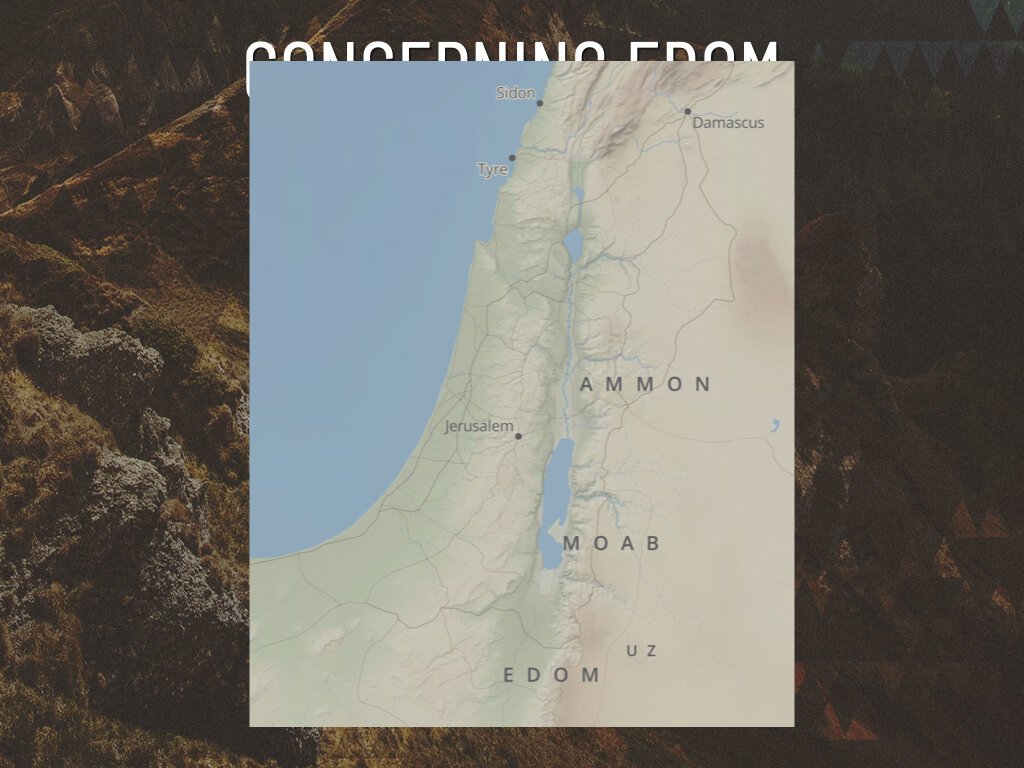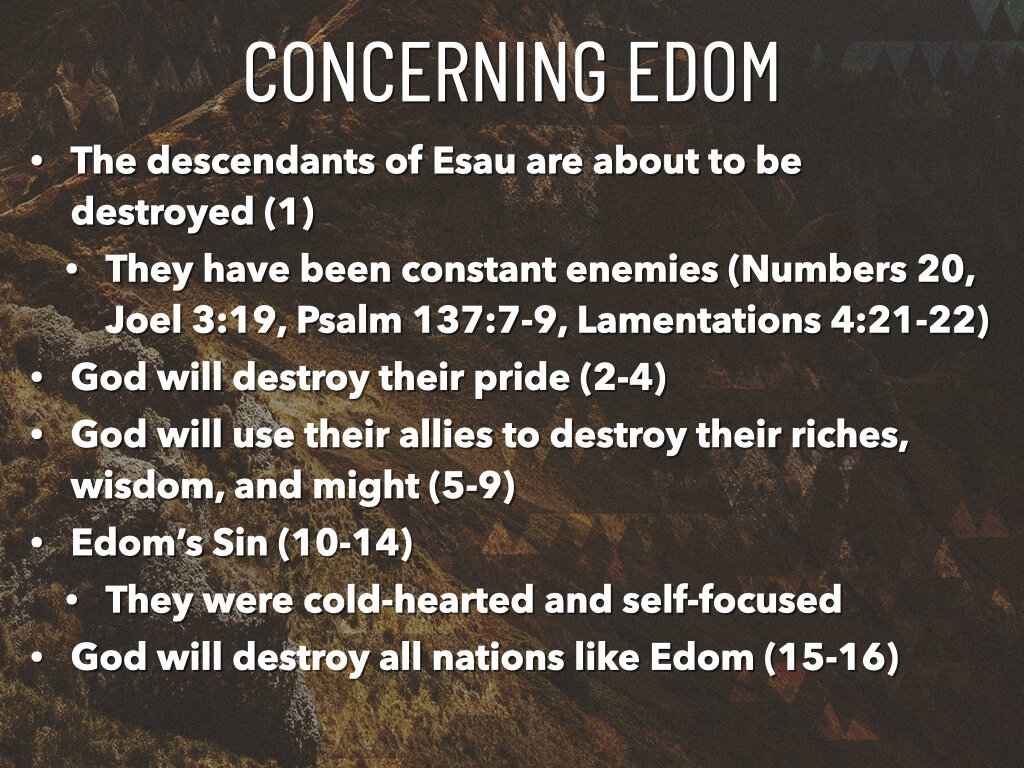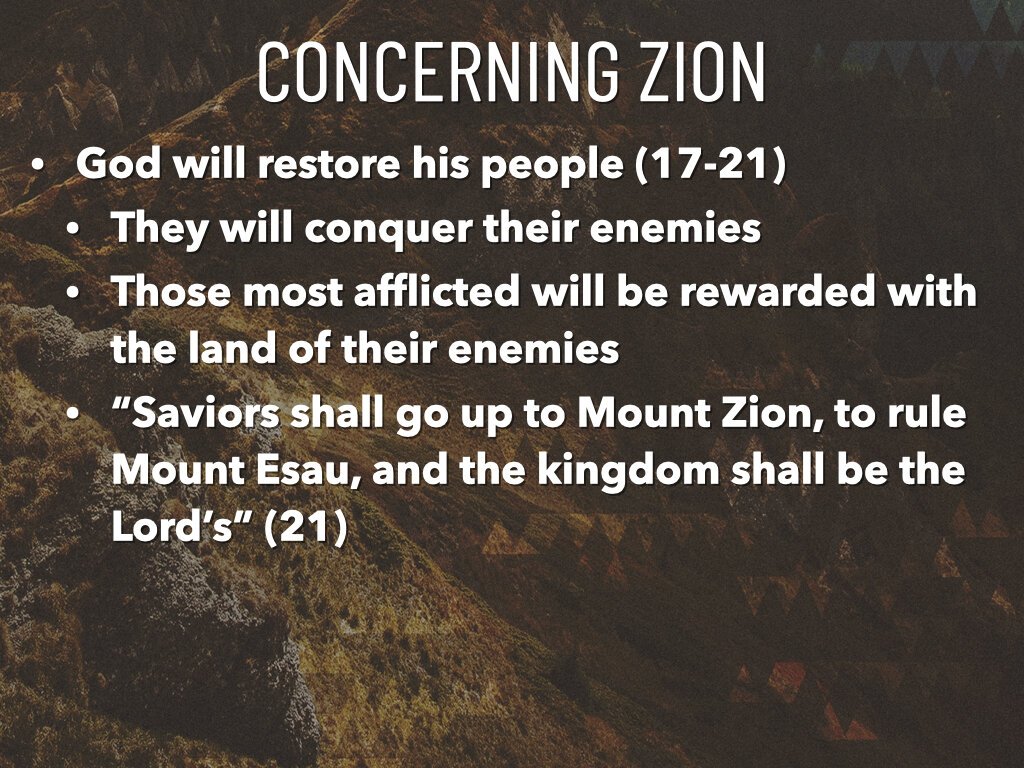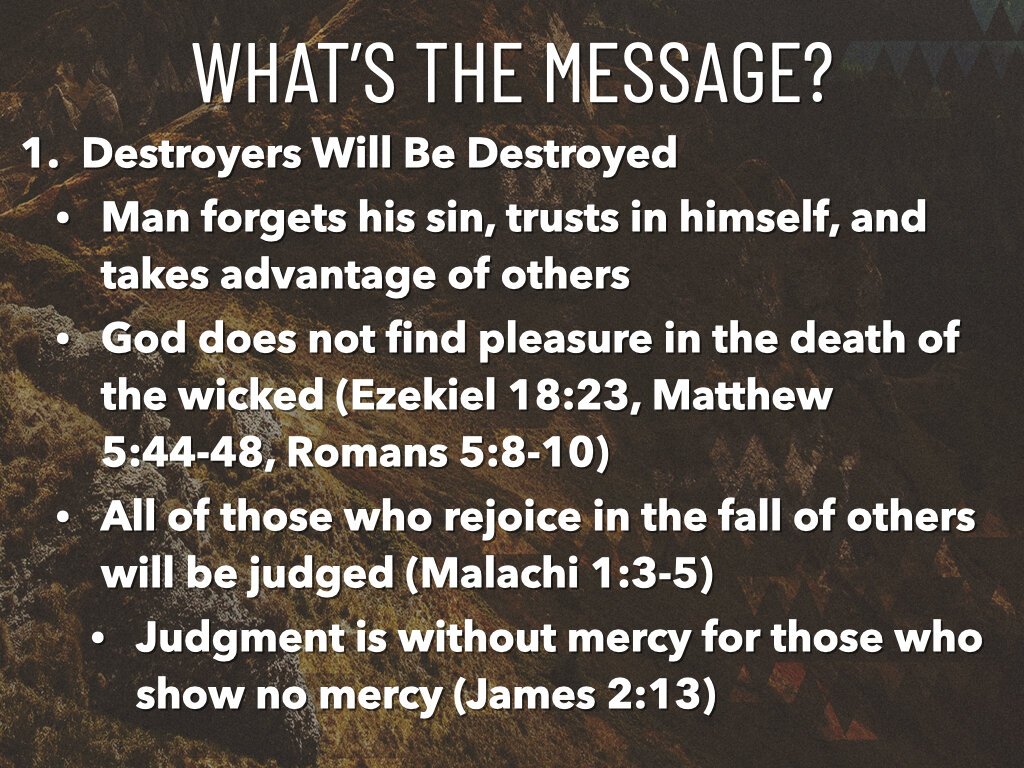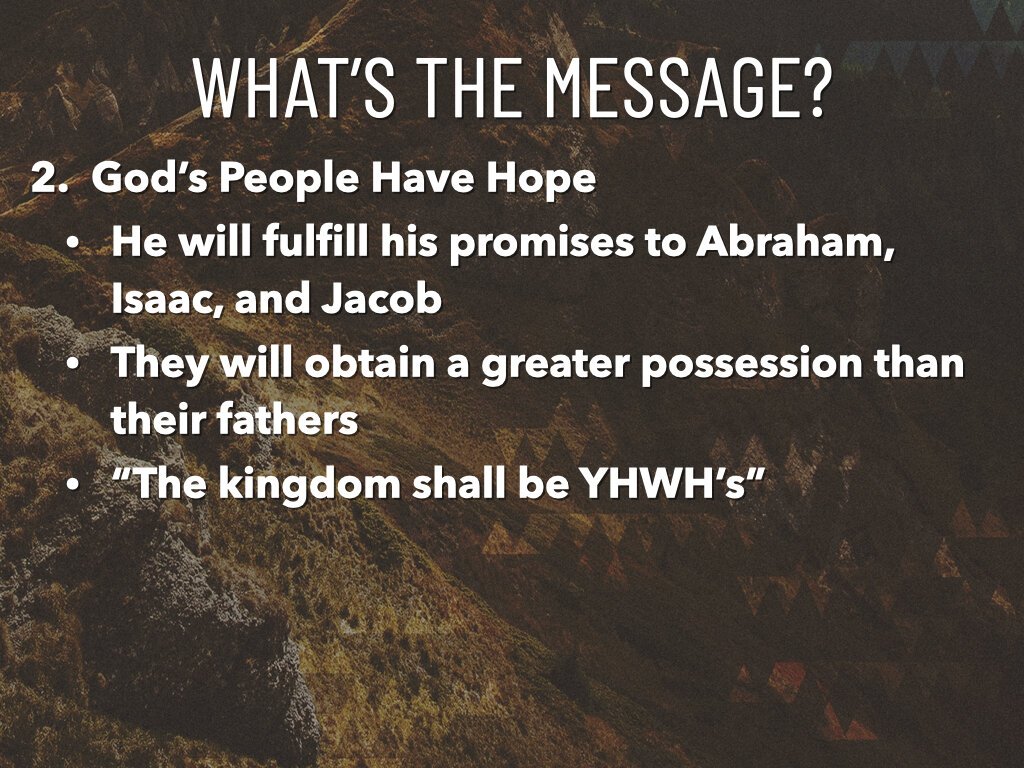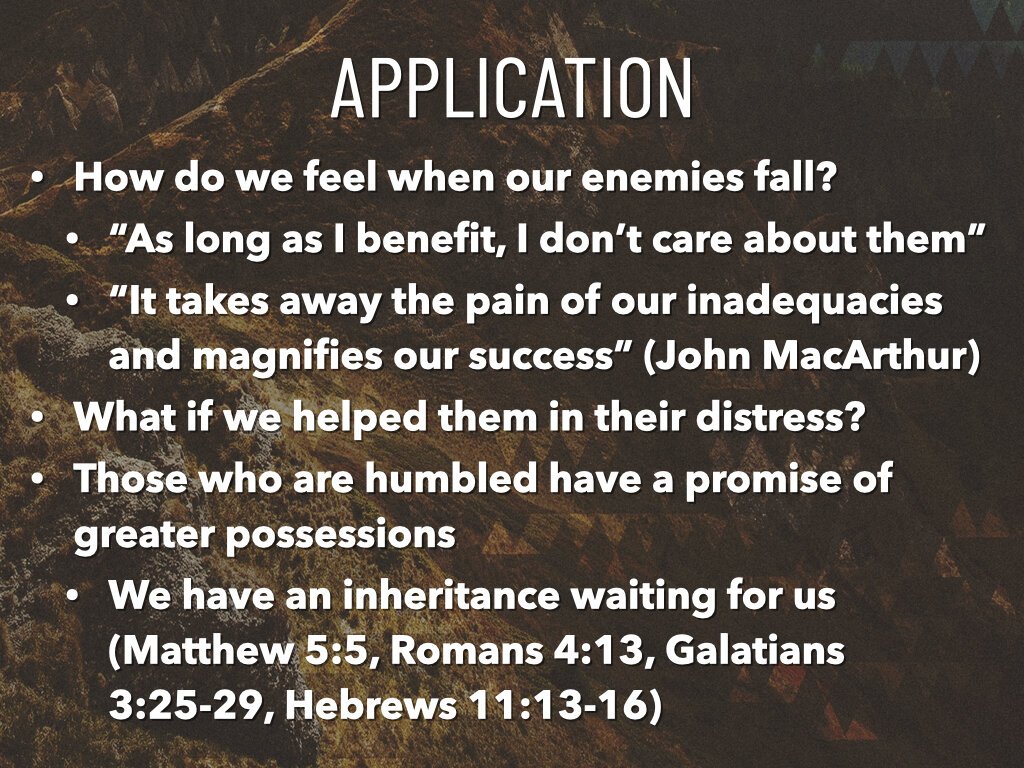Pride Before Destruction (Obadiah)
Obadiah is our last minor prophet, and it is the shortest book in the Old Testament. This is the third prophet who primarily speaks about a nation other than Israel. In Jonah and Nahum, God was speaking to Nineveh. Now, God will speak to Edom.
Edom, if you remember, is the nation that derives from Esau. This nation got its start as an enemy to Israel, and the strife between these two nations has never subsided. In the book of Numbers, we see Edom refusing to let Israel cross their land. They were stubborn and obstinate from the very beginning, but God had commanded Israel not to fight against Edom, Moab, or Ammon because they were relatives (Deuteronomy 2). Eventually, these nations became subject to the Israelites. David and his sons ruled over the Edomites for nearly a hundred years, but as Assyria fought against Judah, the Edomites took advantage to gain freedom.
Overview
The beginning of the book paints a scary scene.
God Will Destroy Their Pride
Obadiah 1--4 (ESV) --- 1 The vision of Obadiah. Thus says the Lord God concerning Edom: We have heard a report from the Lord, and a messenger has been sent among the nations: “Rise up! Let us rise against her for battle!” 2 Behold, I will make you small among the nations; you shall be utterly despised. 3 The pride of your heart has deceived you, you who live in the clefts of the rock, in your lofty dwelling, who say in your heart, “Who will bring me down to the ground?” 4 Though you soar aloft like the eagle, though your nest is set among the stars, from there I will bring you down, declares the Lord.
In these verses, we see how God is calling for the nations to rise against Edom. Why? They think that they cannot be defeated. Notice verse 3 says that the pride of their heart has deceived them. They say in their heart, "Who will bring me down to the ground?" God responds by saying, "I will bring you down." You can just imagine a nation looking at its incredible security and thinking that there is no way any men would be able to conquer them. They have an answer for any opposition. They are unreachable. But what chance do they stand when God decides to go against them?
God Will Destroy Their Wisdom And Might
Obadiah 5--9 (ESV) --- 5 If thieves came to you, if plunderers came by night--- how you have been destroyed!--- would they not steal only enough for themselves? If grape gatherers came to you, would they not leave gleanings? 6 How Esau has been pillaged, his treasures sought out! 7 All your allies have driven you to your border; those at peace with you have deceived you; they have prevailed against you; those who eat your bread have set a trap beneath you--- you have no understanding. 8 Will I not on that day, declares the Lord, destroy the wise men out of Edom, and understanding out of Mount Esau? 9 And your mighty men shall be dismayed, O Teman, so that every man from Mount Esau will be cut off by slaughter.
In the first part of this section, God points out how completely they will be plundered. Those who come in will steal everything from Edom. They will not leave behind enough for the poor to survive. Then, he says that their allies will capture them. In Jeremiah 27, we have an allusion of Tyre Sidon, Moab, Ammon, and Edom trying to talk Zedekiah, the king of Judah, into rebelling against Babylon with them. Edom had withdrawn from the alliance and used an allegiance with Babylon to expand its border into Judah.
But all of their wisdom and might will be no match for God. He will wipe them out and cut them off.
Edom’s Sin
Obadiah 10--14 (ESV) --- 10 Because of the violence done to your brother Jacob, shame shall cover you, and you shall be cut off forever. 11 On the day that you stood aloof, on the day that strangers carried off his wealth and foreigners entered his gates and cast lots for Jerusalem, you were like one of them. 12 But do not gloat over the day of your brother in the day of his misfortune; do not rejoice over the people of Judah in the day of their ruin; do not boast in the day of distress. 13 Do not enter the gate of my people in the day of their calamity; do not gloat over his disaster in the day of his calamity; do not loot his wealth in the day of his calamity. 14 Do not stand at the crossroads to cut off his fugitives; do not hand over his survivors in the day of distress.
This section begins with the word "Because" to indicate the reason behind their judgment. Notice how God is judging them for doing violence against their relatives. God is upset with them for standing aloof while Israel suffered. People were coming in and taking advantage of their vulnerable situation. Edom did nothing to help.
The translation of verses 12-14 might seem off-putting as you read it. It looks like he is commanding Edom not to do horrendous acts in the future. But verses 10 and 11 points to past sin. So God is either condemning them for what they have done or maybe in the process of doing.
Overall, the feel is one of cold-heartedness. They did not pity Jerusalem as it was getting destroyed by nations. Instead, they boasted over and taunted them as they were getting killed. Then, they came in and robbed them after they were too weak to defend themselves. In verse 14, it says that Edomites were catching the people who had escaped the Babylonians to kill them or turn them in. They refused to hide them. Instead of showing mercy, they took advantage of the opportunity.
God Destroys Nations
Obadiah 15--16 (ESV) --- 15 For the day of the Lord is near upon all the nations. As you have done, it shall be done to you; your deeds shall return on your own head. 16 For as you have drunk on my holy mountain, so all the nations shall drink continually; they shall drink and swallow, and shall be as though they had never been.
In these two verses, we see that God is not happy with any nation coming to take the blessings he intended for Israel only. He depicts this as wine flowing from Jerusalem. These unholy nations were drinking to the point of drunkenness from the leftovers of Babylonian destruction. This shows people trying to take God's blessings by force and rejoicing in the fall of God's people. They will be punished and receive what they are owed.
God Will Restore
Obadiah 17--21 (ESV) --- 17 But in Mount Zion there shall be those who escape, and it shall be holy, and the house of Jacob shall possess their own possessions. 18 The house of Jacob shall be a fire, and the house of Joseph a flame, and the house of Esau stubble; they shall burn them and consume them, and there shall be no survivor for the house of Esau, for the Lord has spoken. 19 Those of the Negeb shall possess Mount Esau, and those of the Shephelah shall possess the land of the Philistines; they shall possess the land of Ephraim and the land of Samaria, and Benjamin shall possess Gilead. 20 The exiles of this host of the people of Israel shall possess the land of the Canaanites as far as Zarephath, and the exiles of Jerusalem who are in Sepharad shall possess the cities of the Negeb. 21 Saviors shall go up to Mount Zion to rule Mount Esau, and the kingdom shall be the Lord’s.
The last section of the book is full of hope and promise. God will bring those who escape the judgment back into Zion (Jerusalem) and give them all the land as a possession. His people will be given all of the lands of their surrounding enemies. Those who think they are getting away with some of the blessings will have everything taken away. Meanwhile, God's people will be more blessed than ever before.
What's The Message?
In this book, God wants to make two things very clear. 1) That he will conquer all those who do not show mercy on the less fortunate. 2) That he will restore his people and bless them after they are humbled.
1. Destroyers Will Be Destroyed
This book is an exciting complement to Nahum and Habakkuk. In Nahum, God promised judgment against the Assyrians who he used destroyed the northern kingdom. In Habakkuk, God promises judgment against the Babylonians, who he used to destroy the southern kingdom. Now, we see God promising judgments against Edom and all the surrounding nations like them who rejoice over Israel's fall and take advantage. They will receive a similar punishment in due time. God does not overlook the wickedness that takes place on the earth. He responds.
Application - Don't Be Like Edom
Do you know anyone who hates their enemies? How easy is it for us to rejoice in the downfall of our enemies? We cannot look at every situation with a cold-hearted mentality, thinking, "As long as I benefit from it, I don't care." Aren't you glad that God doesn't feel that way about his enemies in that way?
I can't tell you how many times I've heard or been given the impression that people with a different political view can all just die! Really? Since when has disagreement on a political stance become grounds for execution? Would we actually be happy and rejoicing if they all died? Are we that far gone? Why do we so quickly forget mercy and relish in the destruction of other people?
What about a family member who betrays us or acts hatefully toward us? Are they worthy of a destroyed life? Should we take pleasure in them getting what they deserve? If we do, our "deeds will be returned on our own heads" (Oba 15). Edom was proud because they failed to understand that they were just as evil as Judah. Let's never forget the judgment we are worthy of without the mercy and compassion of God. The words of James ring true, "Judgment is without mercy on those who show no mercy."
2. God's People Have Hope
The words to God's people in the latter part of this book are full of encouragement. God wants them to know that he will avenge them and bring them back. They will triumph over their enemies and obtain a greater possession than their forefathers. All of those enemies who rejoiced at their fall will be destroyed, and the humbled people of God will receive their land as an eternal possession. The greatest testament to this is the last words in the book. God says, "The kingdom shall be YHWH's." God is in control of all nations, and he will use his power for Israel's good and not for their continual punishment.
Application - The Blessing Is Available For Us
When we get into the New Testament, we find Jesus making similar promises. In Matthew 5, he says, "Blessed are the meek, for they shall inherit the earth." In Romans 4:13 and Galatians 3:25-29, Paul talks about Abraham's descendants being the heirs of the world. These promises allude to a future hope for an eternal inheritance, peace, and prosperity.
If we are broken for our sins, God wants to restore us and bless us beyond what we deserve. He wants to be a refuge for the humble and exalt them above the proud, wicked people on earth. So our application from this book is pretty simple.


